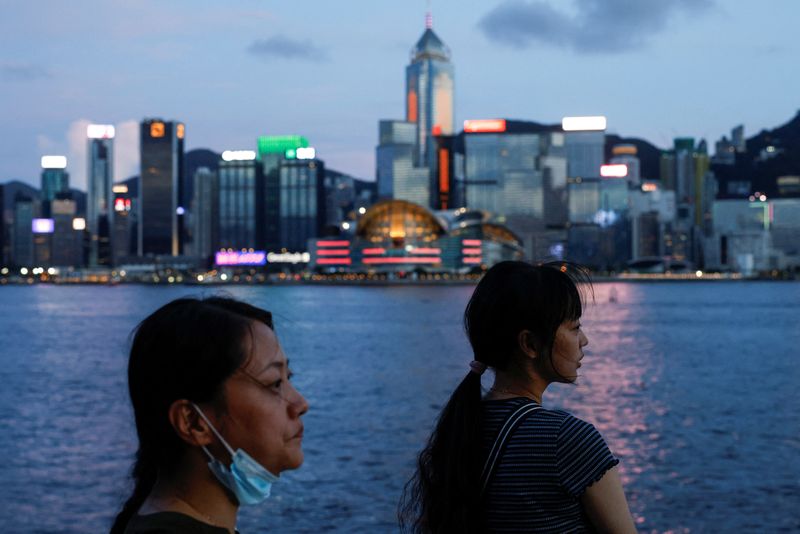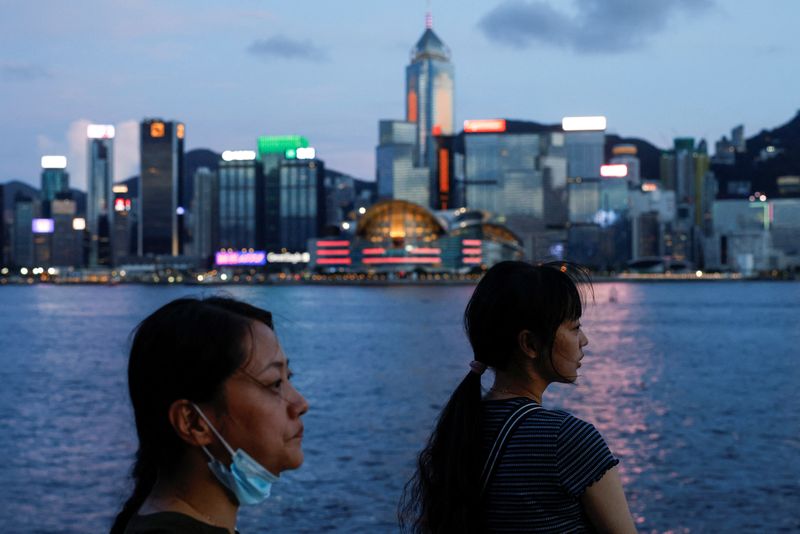Economy
For Hong Kong’s youth, government-backed hostels offer a smidgen of housing hope


© Reuters. FILE PHOTO: Tourists relax on the waterfront in front of Victoria Harbour, with the iconic skyline buildings as a backdrop, in Hong Kong, China June 28, 2023. REUTERS/Tyrone Siu
By Clare Jim
HONG KONG (Reuters) – For most young adults, moving out of home is a rite of passage but in Hong Kong – notorious for its chronic lack of housing – it’s usually an unaffordable dream.
Silver Ho, a 26-year-old hair stylist assistant who was tired of arguing with his parents, counts himself as one of the lucky ones. Two months ago, he landed a spot at a new so-called “youth hostel”, which offers rooms for young adults that are subsidised by the Hong Kong government and can be rented for up to five years.
His 22 square metre (240 square foot) twin-bed room he’ll share with another person is only a bit smaller than the public housing unit he shared with his parents.
Ho also pays rent of just HK$4,400 ($560) per month, 27% cheaper than a space in a sub-divided flat in the same neighbourhood. Such partitioned units often have no personal bathroom and are barely big enough for a bed.
The hostel programme, ramped up last year under pressure from Chinese President Xi Jinping, is aimed at tackling youth frustration with housing – a factor Beijing believes contributed to the anti-government pro-democracy protests that rocked the city in 2019.
It’s also aimed at nurturing what the government considers to be good responsible citizens and providing opportunities for self-development.
Applicants – who must be younger than 31, earn less than HK$25,000 ($3,200) a month and have less than HK$380,000 in assets – are chosen after interviews. They are also required to do 200 hours a year of community service or approved activities to keep their rooms.
For Ho, gaining a room at the BeLIVING hostel has meant independence and saving on commuting time. It’s the first to have been converted from a hotel under a new scheme and unlike the city’s three other hostels, is conveniently located in the bustling commercial area of Causeway Bay.
“I now have more time in the salon to learn new skills and practise. That helps increase my chances of getting a promotion,” he said.
HOME TRUTHS
Hong Kong has been the world’s least affordable housing market for 13 consecutive years, according to research firm Demographia, and housing woes are widely blamed for most of the city’s social problems.
Public housing units are available for low-income people but the average waiting time is 5.3 years. Families and the elderly are favoured, so the chances of one going to a young single person are close to nil.
Hong Kong’s hostel programme first started in 2011 but only gained momentum after Xi visited the city last July and said the government must do more to tackle youth housing and job problems while creating more opportunities for self-development.
At the time, the city had only one hostel with 80 beds. Since then, however, the government has pledged to boost supply.
It now aims to provide 3,000 beds in five years through hotel-to-hostel conversions, which would come on top of 3,400 planned under the first programme that are either being built from scratch or through redeveloping properties owned by non-profit groups.
A survey by the Concerning Youth Housing Rights Alliance published in May suggests the hostels will have limited appeal with close to 90% of respondents saying they don’t plan to apply. Most are instead prioritising saving up to purchase their own flat one day.
That said, applicants for the BeLIVING hostel outstripped the number of beds 5 to 1.
New BeLIVING resident Chelsea Tung sees her move as both a chance to live with her boyfriend while putting aside money for a flat of their own.
“I’ll be able to save up for a downpayment here,” the 23-year-old insurance agent said.
The programme faces several hurdles.
It may be hard to boost the number of hostels as hotels, previously hit hard by three years of pandemic restrictions, are now seeing more demand.
Non-profit groups that run the hostels are also struggling to find a sustainable financing model.
The group that runs the city’s first hostel built under the government scheme said all its rental income goes towards building maintenance and project management.
“We need to think of ways to cut costs and to raise funds to keep operating,” said Carrie Wong, a supervisor at the Hong Kong Federation of Youth Groups.
Ngai Ming Yip, a professor of housing and urban studies at City University of Hong Kong, said the hostel scheme will only provide a limited amount of supply and only goes so far in ameliorating frustration among the city’s youth.
“The root of the problem is not only housing. Research has shown it’s related to young people’s views towards opportunity, outlook, politics, democracy, everything,” he said.
($1 = 7.8136 Hong Kong dollars)
Economy
Russian central bank says it needs months to make sure CPI falling before rate cuts -RBC


© Reuters. Russian Central Bank Governor Elvira Nabiullina attends a news conference in Moscow, Russia June 14, 2019. REUTERS/Shamil Zhumatov/File Photo
MOSCOW (Reuters) – Russia’s central bank will need two to three months to make sure that inflation is steadily declining before taking any decision on interest rate cuts, the bank’s governor Elvira Nabiullina told RBC media on Sunday.
The central bank raised its key interest rate by 100 basis points to 16% earlier in December, hiking for the fifth consecutive meeting in response to stubborn inflation, and suggested that its tightening cycle was nearly over.
Nabiullina said it was not yet clear when exactly the regulator would start cutting rates, however.
“We really need to make sure that inflation is steadily decreasing, that these are not one-off factors that can affect the rate of price growth in a particular month,” she said.
Nabiullina said the bank was taking into account a wide range of indicators but primarily those that “characterize the stability of inflation”.
“This will take two or three months or more – it depends on how much the wide range of indicators that characterize sustainable inflation declines,” she said.
The bank will next convene to set its benchmark rate on Feb. 16.
The governor also said the bank should have started monetary policy tightening earlier than in July, when it embarked on the rate-hiking cycle.
Economy
China identifies second set of projects in $140 billion spending plan


© Reuters. FILE PHOTO: Workers walk past an under-construction area with completed office towers in the background, in Shenzhen’s Qianhai new district, Guangdong province, China August 25, 2023. REUTERS/David Kirton/File Photo
SHANGHAI (Reuters) – China’s top planning body said on Saturday it had identified a second batch of public investment projects, including flood control and disaster relief programmes, under a bond issuance and investment plan announced in October to boost the economy.
With the latest tranche, China has now earmarked more than 800 billion yuan of its 1 trillion yuan ($140 billion) in additional government bond issuance in the fourth quarter, as it focuses on fiscal steps to shore up the flagging economy.
The National Development and Reform Commission (NDRC) said in a statement on Saturday it had identified 9,600 projects with planned investment of more than 560 billion yuan.
China’s economy, the world’s second largest, is struggling to regain its footing post-COVID-19 as policymakers grapple with tepid consumer demand, weak exports, falling foreign investment and a deepening real estate crisis.
The 1 trillion yuan in additional bond issuance will widen China’s 2023 budget deficit ratio to around 3.8 percent from 3 percent, the state-run Xinhua news agency has said.
“Construction of the projects will improve China’s flood control system, emergency response mechanism and disaster relief capabilities, and better protect people’s lives and property, so it is very significant,” the NDRC said.
The agency said it will coordinate with other government bodies to make sure that funds are allocated speedily for investment and that high standards of quality are maintained in project construction.
($1 = 7.1315 renminbi)
Economy
Russian central bank says it needs months to make sure CPI falling before rate cuts -RBC


© Reuters. Russian Central Bank Governor Elvira Nabiullina attends a news conference in Moscow, Russia June 14, 2019. REUTERS/Shamil Zhumatov/File Photo
MOSCOW (Reuters) – Russia’s central bank will need two to three months to make sure that inflation is steadily declining before taking any decision on interest rate cuts, the bank’s governor Elvira Nabiullina told RBC media on Sunday.
The central bank raised its key interest rate by 100 basis points to 16% earlier in December, hiking for the fifth consecutive meeting in response to stubborn inflation, and suggested that its tightening cycle was nearly over.
Nabiullina said it was not yet clear when exactly the regulator would start cutting rates, however.
“We really need to make sure that inflation is steadily decreasing, that these are not one-off factors that can affect the rate of price growth in a particular month,” she said.
Nabiullina said the bank was taking into account a wide range of indicators but primarily those that “characterize the stability of inflation”.
“This will take two or three months or more – it depends on how much the wide range of indicators that characterize sustainable inflation declines,” she said.
The bank will next convene to set its benchmark rate on Feb. 16.
The governor also said the bank should have started monetary policy tightening earlier than in July, when it embarked on the rate-hiking cycle.

 Forex4 years ago
Forex4 years agoForex Today: the dollar is gaining strength amid gloomy sentiment at the start of the Fed’s week

 Forex3 years ago
Forex3 years agoUnbiased review of Pocket Option broker

 Forex3 years ago
Forex3 years agoDollar to pound sterling exchange rate today: Pound plummeted to its lowest since 1985

 Forex3 years ago
Forex3 years agoHow is the Australian dollar doing today?

 Cryptocurrency3 years ago
Cryptocurrency3 years agoWhat happened in the crypto market – current events today

 World3 years ago
World3 years agoWhy are modern video games an art form?

 Commodities3 years ago
Commodities3 years agoCopper continues to fall in price on expectations of lower demand in China

 Economy3 years ago
Economy3 years agoCrude oil tankers double in price due to EU anti-Russian sanctions

























